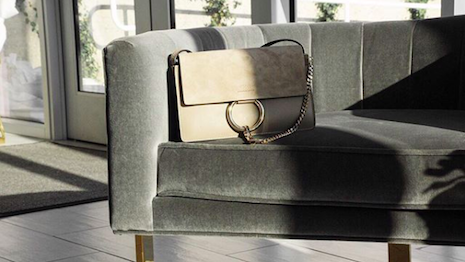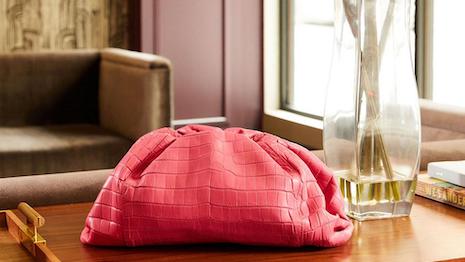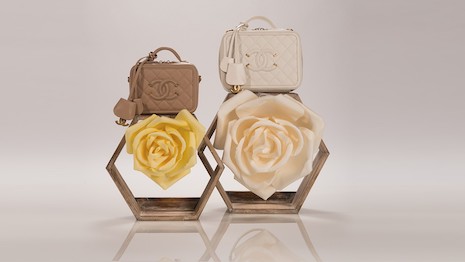 Many luxury consumers are likely to consider reselling and recycling programs for their handbags. Image credit: Fashionphile
Many luxury consumers are likely to consider reselling and recycling programs for their handbags. Image credit: Fashionphile Luxury handbag buyers are extremely unlikely to throw out their handbags after years of use, according to new research from Fashionphile.
The majority of consumers who spend more than $500 on a handbag are also more likely to have a “sustainable mindset,” believing that buying a luxury handbag is better for the environment. When they decide they are done with their luxury handbags, 35 percent of owners are reselling their handbags on secondary marketplaces such as Fashionphile.
"We do feel like with luxury resale being more popular than ever, that more and more people will participate in the sharing economy,” said Sarah Davis, founder and president of Fashionphile, California. “Rather than having bags sit on shelves for literally decades, they’ll be shared with people who will actually use them.
“We support a more edited, curated and cycling handbag closet,” she said.
Fashionphile collected this data in collaboration with research firm Kantar via Kantar’s March 2021 survey of approximately 500 women within the United States over the age of 18 who purchased a handbag within the past 12 months.
A handbag’s journey
In conducting their research, Fashionphile and Kantar divided consumers into three groups. The first group, luxury, consisted of buyers who purchased at least one handbag for $500 or more, accessible luxury consisted of buyers who purchased at least one handbag for $100-499 and fast fashion consisted of buyers who purchased at least one handbag for less than $100.
More than half of the luxury handbag buyers surveyed had what Fashionphile referred to as a “sustainability mindset,” a label applied to respondents who agreed with at least one of the following statements: “Better quality handbags are better for the environment” or “I support brands which make an effort to source sustainable materials.”
 Both Neiman Marcus and Fashionphile sell luxury handbags, such as this Neiman Marcus Bottega Veneta pouch. Image credit: Neiman Marcus
Both Neiman Marcus and Fashionphile sell luxury handbags, such as this Neiman Marcus Bottega Veneta pouch. Image credit: Neiman Marcus
The research showed that a mindset towards sustainability equated to an average of 37 percent more handbags purchased in a 12-month period, with 56 percent of those purchases priced at $1,000 or more. Luxury shoppers without a sustainability mindset spent $1,000 or more on 31 percent of handbags purchased within the same 12-month period.
Twenty-one percent of luxury buyers weigh sustainability as part of their core purchase criteria, while only 6 percent of accessible luxury shoppers and just 3 percent of fast fashion buyers report using sustainability factors to drive their purchase decisions.
Sixty-nine percent of consumers with a sustainability mindset are also conducting research prior to purchase on topics varying from features, 47 percent; consumer reviews, 46 percent; the expected life of the bag, 34 percent; brand values, 24 percent.
Ninety-one percent of respondents with a sustainability mindset agreed with the statement, “It is important to know the source of materials being used in the fashion accessories I buy.”
Handbag quality is directly linked to sustainability for luxury handbag shoppers, with 92 percent stating that it is important to buy fashion accessories that will last a long time, 77 percent stating that they believe luxury brands are worth the purchase because they last longer and 73 percent stating that they believe in buying luxury handbags which last longer is better for the environment.
Luxury consumers are somewhat skeptical of brands’ sustainability efforts, however. Fifty-nine percent of luxury buyers surveyed are skeptical of brands’ intentions with sustainability initiatives, while 39 percent are doubtful of their own ability to make a difference in the environment.
About three-quarters of the luxury group surveyed agreed with the statement, “The more I spend on a handbag, the more I will take care of it.” The study found a direct relationship between the price paid and the likelihood of investing in mending and repairs, with luxury bag owners three times more likely than fast fashion bag owners to seek professional services to extend the life of handbags.
Sixty-two percent of respondents from the luxury group also agreed with the statement, “The brands I purchase reflect my success in life.” Eighty-eight percent of the same group claims that they keep their bags for “a long time,” with 33 percent anticipating more than 10 years of ownership with their most recent luxury handbag purchase.
 Fashionphile has sold secondhand luxury goods since 1999. Image credit: Fashionphile
Fashionphile has sold secondhand luxury goods since 1999. Image credit: Fashionphile
Meanwhile, 9 percent of the fast fashion segment surveyed expressed an explicit intent to throw their new handbag in the garbage when they are done with it, excluding the options of donation, reselling, gifting or repurposing. Zero percent of buyers surveyed with a bag valued at $3,500 or more expressed an intent to dispose their handbag once they are done with it.
When the luxury segment is done with their handbags, many consider various options. Thirty-five percent of the group is reselling their bag on the secondary market, 31 percent of luxury handbag owners are gifting or passing down the handbag and 19 percent are charitably donating.
Of those selling their handbags, 18 percent are doing so themselves through peer-to-peer marketplaces, 10 percent are using online direct-to-consumer resellers like Fashionphile and 7 percent are selling at their local consignment shops.
Power of resale
More affluents reselling or recycling their luxury handbags, as a variety of programs and incentives from brands continue to make the option enticing.
Department store chain Neiman Marcus recently extended its partnership with Fashionphile, after first taking a minority stake in the pre-owned platform in 2019 (see story). Neiman Marcus will be growing Fashionphile’s in-store physical footprint and adding a white-glove service to assist clients.
Last November, ecommerce marketplace Farfetch launched a trade-in program for designer handbags in the U.S. The introduction of Farfetch Second Life allows U.S. consumers to trade in their slightly used handbags for credit to be used towards future purchases on the site.
This debut followed the success of the program's pilot launch in Europe in 2019, as more luxury retailers experiment with secondhand sales and consignment (see story).
With a continued focus on cyclical fashion and brands’ ongoing development of disparate offerings, luxury handbag reselling is not slowing down any time soon.
“We absolutely do see this pattern sticking around, we are excited about what we believe will be coming soon in the lines of proper care, upkeep, repair and mending around accessories to extend their lives,” Ms. Davis said. “We believe there will be real movement in this area.”